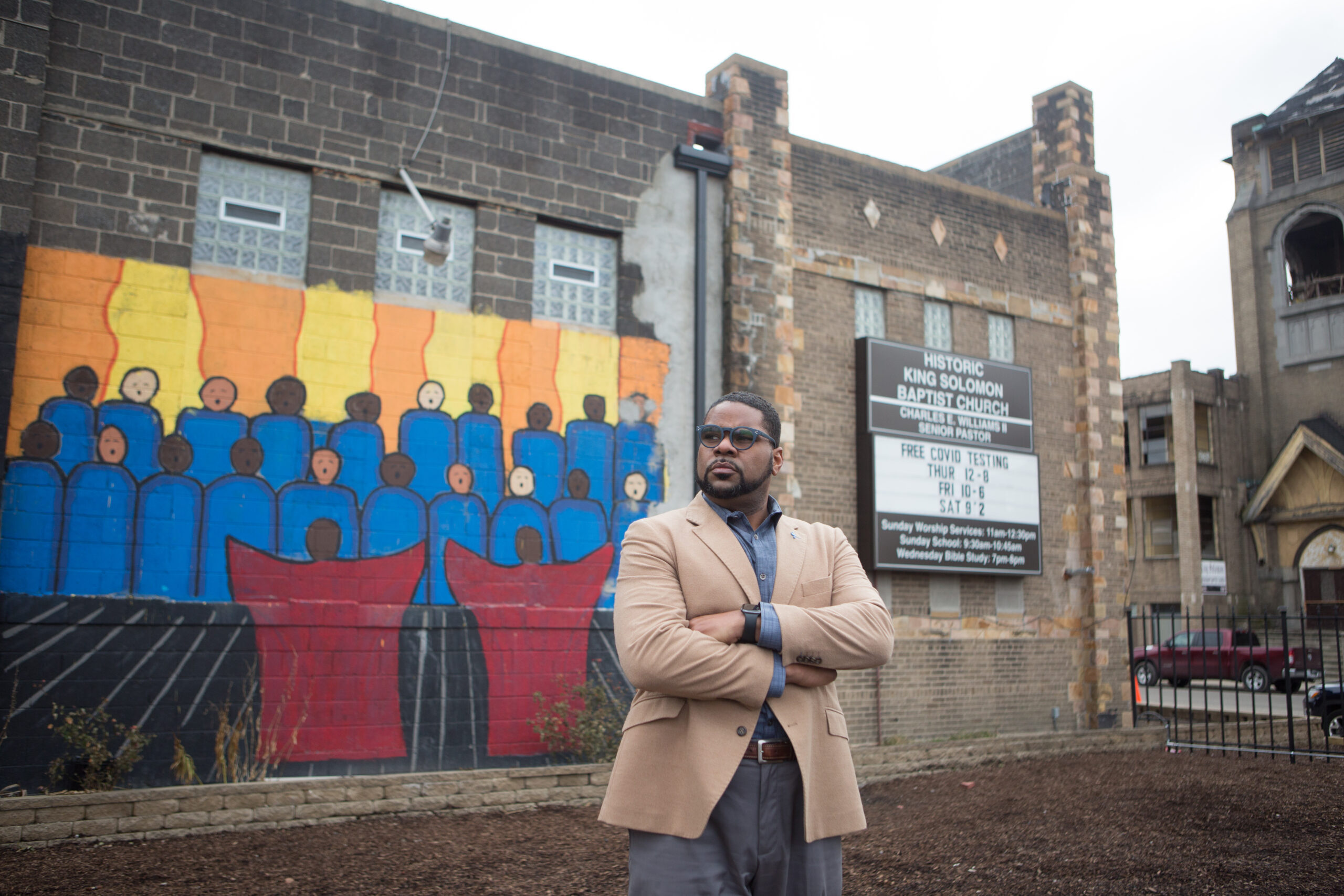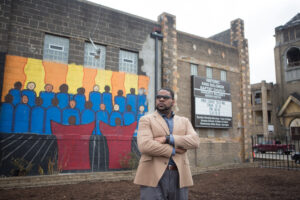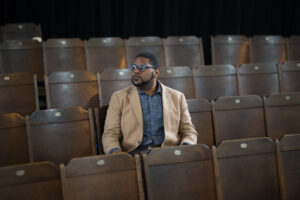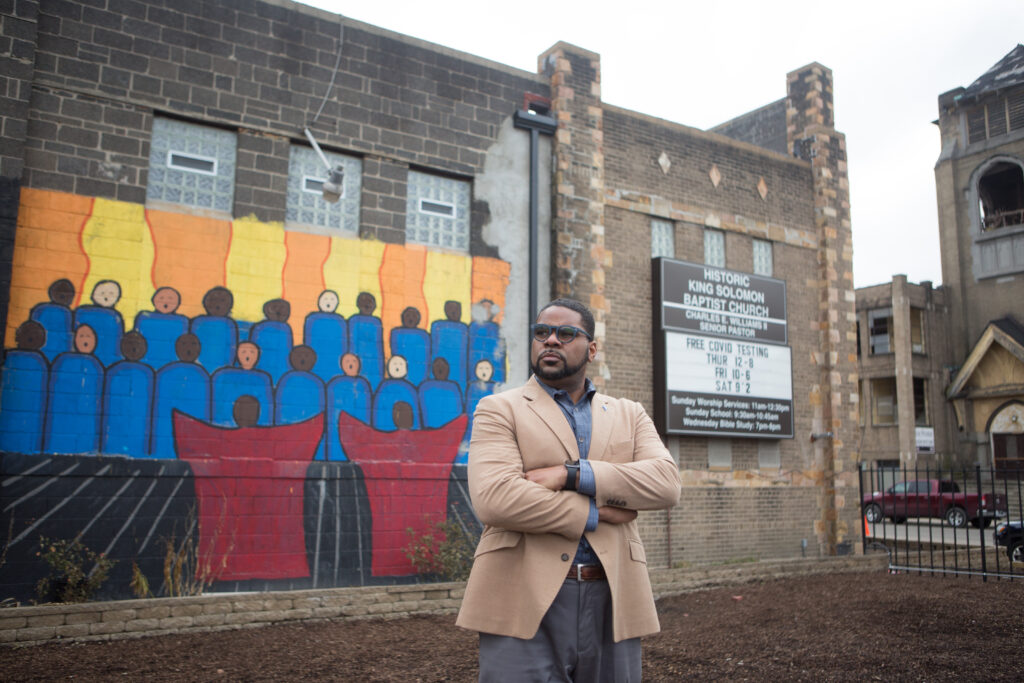Source: School of Social Work

U-M alumnus Charles Williams III leads Historic King Solomon Baptist Church in Detroit.

U-M alumnus Charles Williams III leads Historic King Solomon Baptist Church in Detroit.
Pastor Charles Williams II of Historic King Solomon Baptist Church in Detroit mobilized hundreds of people at the start of the COVID-19 pandemic to make sure the city’s most vulnerable were cared for.
Within days of Governor Whitmer’s emergency stay-at-home order, Williams, alongside other Black activists, made the decision to ensure the city of Detroit’s aged and immunocompromised would not be exposed to the deadly virus. Grounded in principles of mutual aid and fueled by a belief that Black lives matter, Williams’ emergency response effort gained momentum and quickly met needs in Detroit that the existing social service and local government infrastructure could not meet.
Williams earned his Master’s of Social Work at the University of Michigan and also is pursuing his Ph.D. at U-M. For Willliams, whose professional and scholarly journey centers on the intersections between the Black church, service to others and the quest for social justice, this initiative was transformative, pushing himself, his volunteers and the people it served beyond their comfort zone to do what was needed to help their community. This community-led collaborative effort shows us what is possible when you engage both hearts and minds in community change efforts, when your work is grounded in faith and when a more just and equitable future for all drives your reasons for change.
Called to service
“Honestly when I received the call, I wrestled with whether I was more inclined to take an appointment that had a nice salary, in a middle class neighborhood. Then a voice inside said to me, ‘You are needed here, this work is for you.’”
After a year of rigorous vetting, the church elders unanimously voted to appoint Williams as senior pastor. He faced this appointment with mixed emotions. The church’s legacy of community service and civil rights matched his calling, but its faltering facilities, membership and finances were daunting. With great faith he accepted the offer and traveled the road to recovery alongside his congregation. He firmly believed that returning to the church’s roots of service and activism was essential to its comeback and that this would also pave the way to a fairer and more just future for Black people.
Williams is driven by the belief that when the Black church offers substance to the community it serves and connects to the legacy of the church’s early inception, the church and its community thrive. For decades the Black church, as defined by W.E.B. Du Bois and countless scholars, has been everything for Black people at times when society and government failed them. The Church nurtured the spirit of the Black community and served as its social service agency, its school house, its meeting place and its convention center. These original purposes promoted credibility, built community power and met critical needs of the people. Williams believes that when a Black church strays from this original purpose it risks losing influence and its congregation is left wanting.
As a new pastor Williams made sure to connect Historic King Solomon Baptist Church to its social service roots. He established a food pantry at the church, clothing giveaways, Thanksgiving meals and youth mentoring services. When the COVID-19 pandemic hit Michigan in March 2020, Williams was ready to do more. He mobilized his congregation, the community and countless partners to support those who needed help the most.
COVID-19 emergency response
“I never realized that when disaster strikes, pastors and community leaders instantly become essential workers,” Williams said.
On March 13, 2020, the National Action Network Michigan Chapter and 4Hope Organization, both housed in Historic King Solomon Baptist Church, gathered early and mobilized to stem the tide of COVID-19 exposure to protect Detroit’s most vulnerable residents. These groups, along with local, state and national partners and an army of community volunteers, packaged and distributed medications and essential food and supplies to the doorsteps of elderly and immunocompromised individuals.
This effort not only supported those who could not risk COVID-19 exposure but also benefited those engaged in the relief effort. The work built community and encouraged mutual aid among residents of Detroit neighborhoods. It inspired volunteers and taught university students important social change lessons. Most importantly, the work saved lives. Williams firmly believes that providing for those most vulnerable and allowing them to stay safely at home helped turn the tide on Detroit’s disproportionately high COVID-19 death rate.
At the height of the response effort, 30 Black churches were mobilized to deliver 700,000 meals across the city of Detroit. The impact of this cannot be understated. Imagine the fear and desperation of the aging, sick and vulnerable at the height of the crisis. Those with means ordered food delivery or drove to curbside pickup locations, wearing PPE and with easy access to hand sanitizer. What about those without money or credit, internet access, a car or PPE of any kind? Those without a support system? It is for these people that Williams and his partners mobilized.
The bonds between these 30 churches were strengthened through this collaborative work, reaffirming their commitment to service and ingraining in them the knowledge that the Black church has power to solve problems when existing systems and structures fail to deliver.
The churches that participated in this effort, including Historic King Solomon Baptist Church, are continuing their activism and service delivery. In fact, Williams’ church, along with six others, are partnering with the Michigan Department of Health and Human Services and have become COVID-19 testing sites. These churches are leveraging their social capital and position in Detroit neighborhoods to encourage uptake in testing, which in turn will help curb the devastating effects of this virus.
Partnering with School of Social Work ENGAGE
U-M School of Social Work ENGAGE team is a partner to Williams and his COVID-19 relief efforts. Early on in his mobilization, ENGAGE elevated his call to action and routed social work students to assist with food and supply, packing and delivery, logistics and administrative support. These social work students also conducted wellness checks, using their skills to mitigate stress and fear and to link residents with other resources in the community.
ENGAGE also supported grant writing and introduced Williams to philanthropists and other funding mechanisms in the city. Working collaboratively in this way promoted trust and goodwill between the school and Williams’ social justice work, which will help sustain our partnership well into the future.
Williams’ emergency response effort was featured in an ENGAGE virtual session, which drew many from the school into Williams’ work. Together with the students, Williams explored ideas on social work practice in the Black community. He showed students what can be possible when a passion for justice is paired with a commitment to those in need. He inspired many to take action and created opportunities for volunteerism in Detroit during a time when most organizations were going remote and people were sheltering in place.
It’s in the Blood
“I just have a long history in my family of people who cared about the wellness of Black people, and they dared to fight inequality and poverty with everything they had. A tradition I can’t let go,” Williams said.
Williams’ pastoring is social work in practice. In both his history and personal identity, his pastoring and pursuit of social justice intertwine.

“In March 2020 when the stay at home order was issued, worried about those who were vulnerable, I felt like Moses with soldiers behind him and the Red Sea in front of him. Then I heard God say, ‘What’s in your hand?’ My time as an MSW student at University of Michigan put me in conversation with so many people who understood the challenges of poverty and inequality. It was natural for me to stretch my rod out to MSW students, ENGAGE and SSW faculty because I knew they cared.” Rev. Charles Williams II
On Williams’ father’s side several of his family members are Christian ministers, including his father. However it was his great uncle, the Rev. C.L. Branch, founder and pastor of Christland Missionary Baptist Church of Detroit, who had a lasting impact on his life and choice to engage in Christian ministry. As a teen he recalls a conversation with his pastor, Rev. C.L Branch, while in his home church’s soup kitchen. They talked about the power of the Black church to serve as balm for the people. It was then that he affirmed his interest in serving the church and chose pastoring as his way forward.
On his mother’s side his great grandfather Richard Braxton was a deacon and gospel artist at the very church Williams now pastors, Historic King Solomon Baptist Church. Making the city home in the postwar years, both Williams’ great grandfather Braxton and his paternal great grandfather Moody Williams served their Gratiot-area community in various ways.
While Braxton’s service included employment with Detroit’s Sanitation Department, Williams ran two small neighborhood groceries at a time when, even in the Motor City, not everyone had easy access to transportation. As a shopkeeper, Williams was following, in his own way, a long line of social servants that included Daniel Walker Williams, an ancestor who, following his Civil War service, helped to establish a free Black community in Memphis, Tenn.
Williams comes from a family of social workers, and it is his deep lineage of commitment to community and to Black liberation that keeps him focused on the work on a day-to-day basis. His grandmother received a graduate social work degree from U-M, his mother from Eastern Michigan University and his father from Wayne State University. Williams remembers spending many evenings attending meetings of the National Association of Black Social Workers. Social work’s values, its commitment to social justice and its opposition to racist systems and structures were early lessons for Williams, helping to shape the activist and scholar he has become.
The way forward
“More than half of my life, I’ve been working in the Black church wondering: Why don’t we get support? But in an enlightened moment I realized if you want to inform the process and change the rules, you have to go to the place where they shape them. My goal at Michigan is to learn the process, inform it and build on it,” he said.
In September 2020, Williams joined the joint doctoral program at the U-M School of Social Work and Sociology. Through his studies he hopes to further explore the role of the Black church in social service delivery, health equity and social justice movements. The Black church has been a touchstone for black people for decades.
Black churches mentor youth, build families, provide mental health networks for seniors, fight white supremacy, deliver social services and pursue social justice. Building on the social work and sociological works of Robert Taylor, Linda Chatters, Lawrence Mamiya, C. Eric Lincoln. James Cone and Andrew Billingley, Williams will continue a tradition of investigation on why the Black church is systematically overlooked and appropriated into the evangelical narrative of the white church. This exploration will help to strengthen the role of the Black church in the lives of Black people by identifying interventions that bring the social safety net closer, extend more opportunity for philanthropy and contribute to closing health disparities.
The Black church and its social service and research functions after the American Revolution preceded the Jane Addams and Hull House movement while white social work practice struggled to meet the needs of the Black community. Social work practice in the late 70s and early 80s created stigma within the Black community, further disenfranchising Black people and contributing to the gross health, economic and social disparities we see in society today. Learning from Black churches by tributing the foundations of social work past traditional foundations could open a window of opportunity for the social work discipline to learn new ways of servicing Black communities.
Williams’ doctoral research will provide a roadmap for how institutions, whether a social service agency, healthcare system or foundation, can work collaboratively with Black churches to solve some of the most pressing social problems of our day. Williams believes that the future will be brighter for Black people and for all people.
“There are approximately 4,000 Black churches scattered throughout Detroit neighborhoods. They are doing good work with little-to-no external resources. In the Blackest and poorest city in the nation, could you imagine turning these houses of worship into harbors of help as functioning social service agencies and health clinics?” he said.


